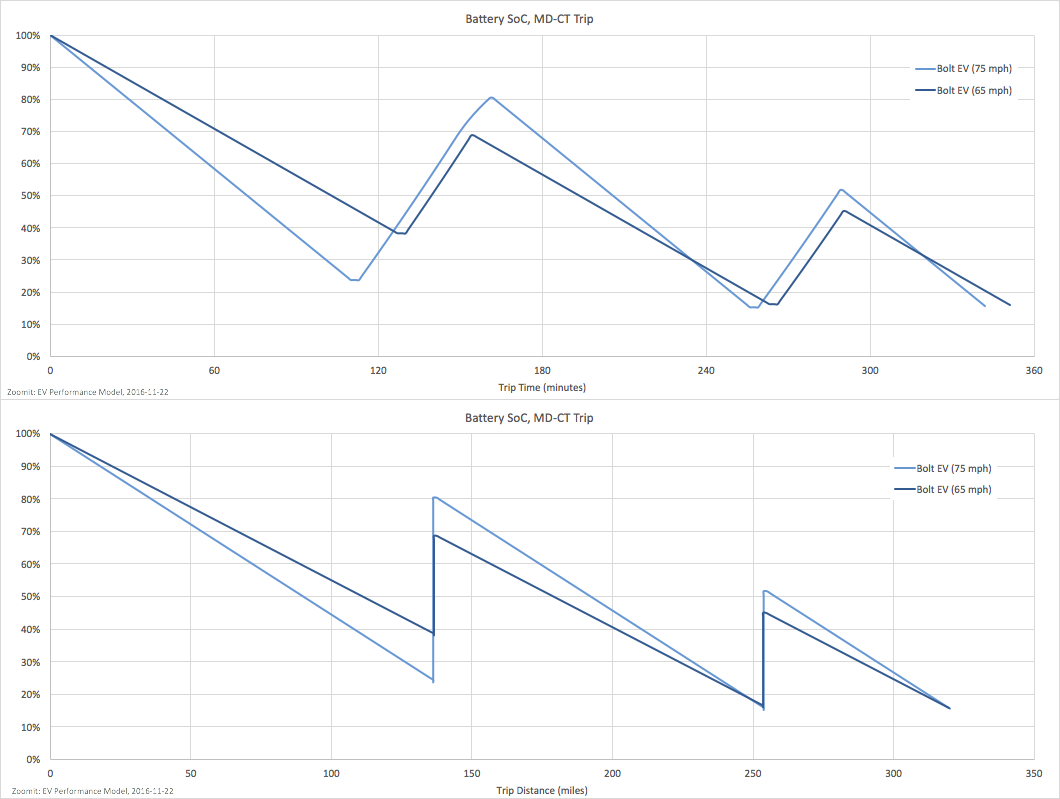I went on a road trip this weekend to SF from LA to collect range and efficiency data. Check out the details at my blog and let me know if there are any questions about the car!
http://boltev.blogspot.com
http://boltev.blogspot.com

EVgo forces the chargers to stop after 30 min to ensure people do not stay hooked up after charging. Seems like a flawed position since nothing forces you to disconnect and cars like the Bolt will a lot of times need more than 30 min of charge time.leodoggie said:Great blog, I have been reading it since you started it. Have you ascertain why the charge sessions time out?
We make this trip twice a year to visit relatives in Orange County, we normally use I-5, but I assume that is not feasible yet due to lack of fast chargers.
The secret is to dress warmly and wear a toque and gloves.Michael1 said:I could not drive in 45 degree weather without heat. I'd freeze to death.
SeanNelson said:The secret is to dress warmly and wear a toque and gloves.Michael1 said:I could not drive in 45 degree weather without heat. I'd freeze to death.
Nagorak said:With the current state of charging, I'm wondering if, counter-intuitively, it may not end up being faster to drive the whole way at 55 mph.
tgreene said:Nagorak said:With the current state of charging, I'm wondering if, counter-intuitively, it may not end up being faster to drive the whole way at 55 mph.
There is no need to wonder - this is an easy calculation. Just write an equation for "speed made good," the distance divided by the time. You can simply find the maximum if you put in equations for distance per charge and the charge rate, but that may not correspond to the real world if you examine a large enough range of speeds so that different ones require different numbers of charging stops.
That said, there is an easy way to think about this. Driving 300 mi at 55 mph takes 70 minutes longer than at 55 mph. Say that driving at 70 mph requires x more Wh per mi than at 55 mph. The energy difference works out to 9.1 kW for 300 mi of driving for 3.8 mi / kWh at 70 mph and 4.3 mi / kWh at 55 mph (just guesses). Charging at 45 kW (125A ABB charger @ 360V) delivers 9.1 kW in under 14 minutes at 90% charging efficiency, and this is much less than the extra 70 minutes. Therefore driving at 70 mph will get you there almost an hour faster than at 55 mph!
I don't have a Bolt, so people who do could substitute real mi / kWh numbers to get a more accurate estimate.
SparkE said:Also, time spent getting to/from charging unit was ignored: /quote]
No, this was not ignored. There is no extra time required for getting to / from a charger if you have the same number of stops but just deplete the battery different amounts at the 2 speeds. Of course adding another charging stop is a big time waster. This is especially true in California where a lot of charging units are pretty far from the freeway (thinking about Salina, San Luis Obispo off 101). Hopefully the new CEC-funded DCFCs will start showing up this year.
I looked at the difference in total trip duration for a 320 mi trip at speeds of 75 mph and 65 mph. The 65mph speed took only 9-minutes longer over the almost 6 hour trip. I expected a greater discrepancy so this result was surprising.Nagorak said:Yeah, if we knew the wh/mi for various speeds, and also the charging time it would be possible to calculate all of this. For the Leaf we have that sort of information (maybe for some other EVs too?). I think the Bolt is too new for anyone to have collected that sort of data yet?

Michael1 said:SeanNelson said:The secret is to dress warmly and wear a toque and gloves.Michael1 said:I could not drive in 45 degree weather without heat. I'd freeze to death.
Or maybe a snowmobile suit.
Enter your email address to join: